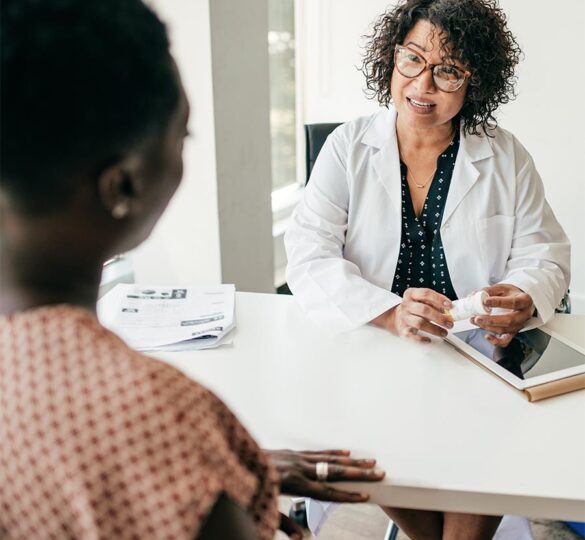7 Ways to Make the Most of Your Glaucoma Doctor Visit
As glaucoma patients, a basic understanding of glaucoma and its treatment is helpful to prepare for eye doctor visits.

Doctor’s visits can sometimes be overwhelming, creating anxiety about the state of our disease. This sometimes creates a situation where we don’t get as much as we would like from our interactions at the physician’s office.
Being prepared for the visit helps to prevent this and alleviate some concerns. As glaucoma patients, a basic understanding of glaucoma and its treatment is helpful as we prepare.
Reading a resource such as Understanding and Living with Glaucoma, a free publication from GRF, will be helpful to achieve this goal. This allows us to be best prepared in understanding the process and in helping to make sure we provide important information and ask the right questions. Remember, your physicians are there to partner with you in your care, and to help you achieve the best outcomes. Let’s go for a visit!
Your Preparation
Preparing for your visit is key to having a good doctor’s office visit. Keep a good record of your appointment date and time, and make sure you have enough time planned for the visit. Ask at the time of check-out from your prior exam, and document whether your next visit will be short or extended, so you can plan appropriately.
Plan to arrive early so that you remain calm during the process. If your visit will require any special testing such as a visual field test, have a good night’s rest and a light breakfast so you can remain alert during the test. Morning testing times are probably preferable, especially if you tend to fall asleep during the visual field tests.
Your Symptoms
Make sure you come with a list of new symptoms, if any. Symptoms that you have may be related to disease state, side effects, or complications of medication or surgery. Symptoms like redness, irritation, itching, tearing, or decreased vision, amongst others, should be reported to your doctor. In preparation for your visit, keep a home journal and note symptoms, reactions and when they happen, etc.
Your Medication
Bringing your medication or an updated list to your appointment is always helpful. It not only allows your physician to see what you are currently using and how often, but also allows you to check the need for refills. Sometimes, being on so many eye drops can create confusion about how the drops are used. A chart from the doctor’s office with the drug name, times and frequency of instillation, and color codes of the bottle tops will help to keep this straight.
Any new medication added to your treatment by other doctors should be mentioned to your glaucoma doctor. The use of steroids and several other classes of drugs could have a bearing on your glaucoma. Remember, be honest about how regularly you have been taking your drops as it allows your doctor make the best medical decisions for you.
Your Progress
The essence of the glaucoma visit is to make sure we are on the right track to keeping glaucoma stable. In addition to checking your eye pressure, several tests are done at your glaucoma follow-up visit to make sure things are going well. It’s important to leave the doctor’s office with a clear understanding of whether things are remaining stable or possibly worse, or if additional testing is required.
Your doctor will be able to tell you this after he or she evaluates you and interprets the test results. It is important to listen carefully and patiently to the doctor’s explanation as it may answer a lot of questions you may have. Bringing someone along as a second set of ears is helpful, especially early on after your diagnosis.
Your Questions
Question are best written down in your journal so you don’t forget to ask something that is important to you. Some questions you may be interested in asking could be related to ways of managing glaucoma, new tests available for helping to diagnose and follow glaucoma, or research studies and breakthroughs available for people with glaucoma. Signing up to receive the Gleams newsletter from GRF will keep you up-to-date and may give you additional insights.
Your Support
It is important to know that there are support systems to help you care for your glaucoma. This could vary from a family member or friend (to come along on your doctor’s visit to reinforce information you are given) to glaucoma support groups. The medical team at the doctor’s office including the technicians and nurses are also part of your care group and are always happy to help. They are very resourceful so please engage with them on your visits. They would be happy to help you set alarms on your phone to remind you about medicines if that would be helpful to you.
Don’t hesitate to ask about resources available locally for the visually impaired. Some doctors’ offices have a list of local services or can point you in the right direction. Resources available could be interest based like audiobooks, or service based such as rehabilitation services that can help make living with low vision easier.
Your Journal
Keeping a good journal is a useful practice for a glaucoma patient. It not only allows you to note follow-up appointment information, but also symptoms, medication related information, pressures (if you are so inclined), and diagnosis-related information, to name a few. It also helps to make sure you keep a routine follow-up schedule, as this is paramount to the success of managing your glaucoma.
With these tips, going to see your glaucoma doctor can not only be less stressful but also more productive. Having the right outlook can strengthen the physician-patient partnership for providing you the most beneficial care.
Article by Oluwatosin U. Smith, MD. Posted on September 1, 2017 — Last reviewed on March 7, 2022.

Oluwatosin U. Smith, MD
Dr. Oluwatosin “Tosin” Smith is an Attending Surgeon at the Glaucoma Associates of Texas, and Adjunct Associate Professor of Ophthalmology at UT Southwestern Medical Center.